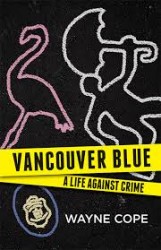Vancouver Blue
By Wayne Cope
Harbour Publishing
223 pages, $22.95
Reviewed by Adam Hayman
If you like crime procedurals on TV, Vancouver Blue will entertain you. If you are like me, with a case of police phobia, it helps reveal cops as real humans. Wayne Cope’s stories sound like he’s sharing them over a beer, and he pursues a good tale the way he did his police work – with a sharp eye for detail and a measured attention span.
Cope divides his book into sections: his stint on the dog squad, as a beat cop, a detective, a motorcycle cop with the traffic division, in the major crimes division, and the historical homicide unit (a handful of years on each section speaks in part to his measured attention span). His book time on the force begins in 1975 and ends in 2009. Each section is packed with fully fleshed-out anecdotes and Cope’s theories on policing. “I developed my own rule about writing tickets: leave the humans alone. So regular taxpayers got warnings. Scrotes, drunks, criminals and gangsters got tickets. And I’ve maintained that rule for more than 34 years of policing.”
Within the first 50 pages, Cope sets himself up as that overly honest uncle we all have (or wish we did), laying down the world in a black and white fashion. He frequently makes clear delineations – with little wiggle room – between a good person and a bad person with. “We have the most liberal judges in the civilized world, judges who are incapable of dealing with these repeat offenders who, in a sane world, would never be released from prison.” He also paints all drug users with the same brush and never offers any sympathy, but after reading Cope’s stories, and learning how he thinks, I’m sure he would respond, “Why should I?”
Cope’s bar-talk style of writing affects his transitions between anecdotes. In a bar, gulps of beer can be enough of a transition into the next tale, but in Vancouver Blue Cope frequently will just start a new paragraph with a sentence like, “And now for the fastest confession ever obtained.” However, while I’m not sure in what order Cope wrote his stories, the writing seemed to improve as the book progressed. By the end of the book, Cope is sharing with us his time on the historical homicide unit, cracking cold cases and organizing long undercover stings on crooked criminals. This section of the book was a highlight for me, and is perfect fodder for anyone who binge-watches crime procedurals.
For a book that is amusing, easy to read and truly honest about police work, I would look no further than Vancouver Blue. I only wish I could have heard the stories directly from Cope himself. Perhaps he should record an audiobook.
Adam Hayman is a Victoria journalist and reviewer.

{ 1 comment… read it below or add one }
Glad you enjoyed the book. Most of the stories have been told over a beer, at one time or another.
Cheers,
Wayne